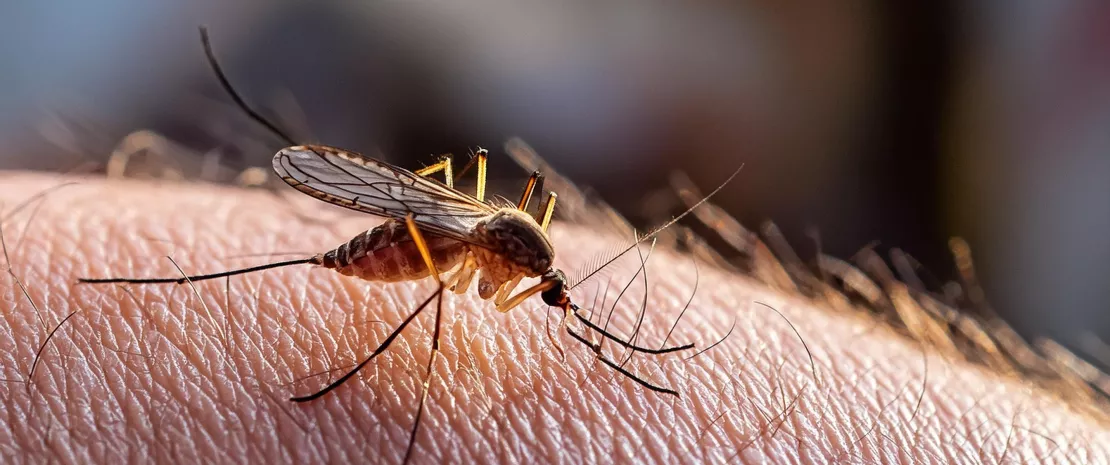Bacterium immunizes mosquitoes against Dengue fever and Zika infection
To protect ourselves from Dengue and Zika, we should first protect mosquitoes. This is essentially the strategy put forward by a Chinese team, whereby the mosquito simply ingests a bacterium that will stay in its digestive system for the rest of its life, preventing it from being infected by the virus, and therefore from transmitting it to humans.
- Learn all about microbiota
- Microbiota and related conditions
- Act on your microbiota
- Publications
- About the Institute
Healthcare professionals section
Find here your dedicated section
Sources
This article is based on scientific information

About this article
While the strong usually eat the weak, every year the minuscule mosquito causes hundreds of millions of cases of severe or even fatal disease by transmitting parasites (malaria) or a wide variety of viruses to humans through their bites, e.g.
(sidenote:
Flavivirus
is a genus of viruses which consists of >70 members including several that are considered significant human pathogens. Transmitted to humans through the bite of infected mosquitoes, Flaviviruses display a broad spectrum of diseases that can be roughly categorised into two phenotypes:
- systemic disease involving haemorrhage (Dengue and yellow Fever virus)
- and neurological complications (West Nile and Zika viruses)
Explore
https://pubmed.ncbi.nlm.nih.gov/34696709/
)
(
(sidenote:
Dengue
viral infection transmitted to humans through the bite of infected mosquitoes. Most people with dengue have mild or no symptoms and will get better in 1–2 weeks. Rarely, dengue can be severe and lead to death. If symptoms occur, they usually begin 4–10 days after infection and last for 2–7 days: high fever (40°C/104°F), severe headache, pain behind the eyes, muscle and joint pains, nausea, vomiting, swollen glands, rash. Individuals who are infected for the second time are at greater risk of severe dengue. There is no specific treatment for dengue.
Explore
https://www.who.int/en/news-room/fact-sheets/detail/dengue-and-severe-dengue
)
,
(sidenote:
Zika
viral infection transmitted primarily by Aedes mosquitoes, which bite mostly during the day. Most people with Zika virus infection do not develop symptoms; those who do typically have symptoms including rash, fever, conjunctivitis, muscle and joint pain, malaise and headache that last for 2–7 days. Zika virus infection during pregnancy can cause infants to be born with microcephaly and other congenital malformations as well as preterm birth and miscarriage. There is no specific treatment available for Zika virus infection or disease.
Explore
https://www.who.int/news-room/fact-sheets/detail/zika-virus
)
, etc.),
(sidenote:
Alphavirus
genre de virus comprenant 27 virus dont le redouté (et imprononçable) Chikungunya, qui après un délai d’incubation de 2 à 10 jours, provoque une fièvre et des atteintes articulaires sévères. Les alphavirus sont transmis par la piqûre d’un moustique infecté.
Explore
https://www.ncbi.nlm.nih.gov/books/NBK7633/
)
(Chikungunya), etc. What if the solution is not to eliminate the mosquito (insecticides) or keep it at bay (mosquito nets, repellent), but simply to prevent it from catching the virus and transmitting it to humans?
Cases of dengue in the world
Between 2000 and 2019, the World Health Organization (WHO) reported a tenfold increase in the number of dengue fever cases worldwide, from 500,000 to 5.2 million. After a slight decline during the COVID-19 pandemic, an upsurge in dengue fever cases was observed worldwide in 2023. 2
Protecting the mosquito...
This serious solution has been put forward by a Chinese team based on their work on the gut microbiota of mosquitoes. Among the 55 bacteria present in the insects’ digestive tract, one – Rosenbergiella YN46 – caught their attention. Why? Because it permanently prevented the mosquitoes that ingested it from catching flaviviruses.
How is this possible? This bacterium takes up permanent residence in the mosquito’s digestive tract, where it transforms glucose (sugar) into an acid. As a direct consequence, the digestive tract contents become highly acidic, spoiling the flaviviruses. Unable to infect mosquitoes, these viruses will not then infect humans.
390 million With up to 390 million people infected each year, dengue fever is the most common mosquito-borne flavivirus worldwide. ¹
...to protect humans
The researchers did not confine themselves to laboratory work. They confirmed their idea in the field. They observed that, in the prefectures of the Chinese province of Yunnan in which Dengue wreaks havoc, mosquitoes rarely harbor the bacterium in their digestive systems. Conversely, in prefectures where only a few isolated cases of dengue fever have been reported, the majority or almost all mosquitoes (91.7% in Wenshan prefecture) carry the bacterium.
The good news is that not only is it easy to inoculate mosquitoes with the bacterium (you just need a bowl of sugar water containing the bacterium), but that the insect retains it throughout its life (from aquatic larvae to winged adult) and passes it on to the next generation. In other words, inoculation with the protective Rosenbergiella YN46 bacterium lasts for life and is passed on to the mosquito’s offspring.
223,000 There were 223,000 confirmed cases of Zika infection in the Pacific Islands and the Americas between 2015 and 2017. ¹
Conclusion
So, while it may not be possible to exterminate this pesky insect, this potential (sidenote: biological control Biological control is an environmentally sound and effective means of reducing or mitigating pests and pest effects through the use of natural enemies. Explore https://www.sciencedirect.com/journal/biological-control ) method may go a long way towards reassuring the growing numbers of people who, in addition to being bitten, fear the transmission of dengue fever or Zika infection.












